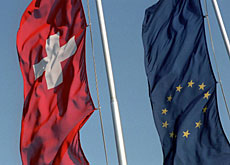
Parties shy away from EU debate

Most Swiss politicians are steering well clear of the question of European Union membership in the run-up to October’s parliamentary elections.
Only the rightwing Swiss People’s Party – which like most voters is staunchly eurosceptic – is insisting that relations with Brussels are a major election issue.
The People’s Party says the upcoming elections are also a vote on Switzerland’s future relations with the EU and it has challenged the other three main parties to declare where they stand.
“For years the other parties have been saying Switzerland should eventually join the EU and now with the elections just around the corner they say they don’t want to discuss it,” Aliki Panayides, the party’s vice secretary-general, told swissinfo.
“We are the only party that has been consistently saying Switzerland should not join the EU,” she added.
Opinion polls over the past year have shown that voters believe the People’s Party has the most clearly defined policy on Europe.
But René Schwok from Geneva University says attempts to make Europe a dominant theme in the run-up to the elections are not having much impact.
“From a tactical point of view the People’s Party is doing the right thing,” he told swissinfo.
“But [their message] seems to be falling on deaf ears, and I don’t see them gaining a lot of votes by trying to make Europe a campaign theme.”
Thorny issue
Schwok says the political establishment doesn’t want to get embroiled in a debate on Swiss-EU relations because it knows talk of membership is a potential vote-loser.
“They are right not to mention what is a very thorny issue with the electorate,” he said.
“Just two years ago there was a nationwide vote on whether to start negotiations about joining the EU, and less than 24 per cent of Swiss voted in favour,” he added.
While the EU debate has been carefully sidestepped by most of the parties, there have been several indications that the subject will be revisited very soon.
Christiane Langenberger, president of the centre-right Radical Party, said recently that although it was clearly too early to contemplate Switzerland joining, there should be an “open discussion” about ties with the EU.
And in a foreign policy statement in November 2000, the government said it wanted to decide on when to begin negotiations for EU membership by 2007.
Bilateral accords
The government’s preferred means of improving ties with the EU has been to negotiate a series of bilateral agreements.
A first set came into force in June 2002 and included a deal on the free movement of people between the current 15 member states and Switzerland.
How this accord will be extended to the ten new member states when they enter the EU next May leaves Schwok in no doubt that the subject of Swiss-EU relations will resurface shortly after the Swiss have been to the polls.
“We know perfectly well that after the elections there will be a new psychodrama in Switzerland about extending the first set of bilateral agreements to the new member states,” he said.
“I’m convinced the discussion could start as early as the beginning of next year.”
He expects both the Right and the Left to exploit Swiss fears of a potential influx of cheap labour from central and eastern Europe.
Media coverage
The media have also been shying away from Brussels, concentrating instead on domestic issues such as public spending cuts, pensions and health.
Although some column inches have been given over to the issue, Schwok insists it is clear that the media, who are generally in favour of closer ties with the EU, do not want to force the debate on the public.
“Many in the media either support EU membership outright or prefer the path of bilateral agreements that Switzerland has chosen,” he said.
“It’s not a conspiracy, but it’s clear that the media does have a view on Switzerland’s attitude and behaviour towards the EU, and it does not want to follow the People’s Party on this issue.”
swissinfo, Jonathan Summerton
According to a recent opinion poll, the five major electoral issues are: unemployment and the economy (33%), pensions (32%), asylum (26%), health (18%) and the environment (14%).
In a November 2000 foreign policy statement, Switzerland stated its intention to join the European Union.
The government said it wanted to decide on when to begin negotiations for membership by 2007.
Swiss voters overwhelmingly turned down an initiative in March 2001, which called for immediate talks on EU membership.

In compliance with the JTI standards
More: SWI swissinfo.ch certified by the Journalism Trust Initiative




























You can find an overview of ongoing debates with our journalists here . Please join us!
If you want to start a conversation about a topic raised in this article or want to report factual errors, email us at english@swissinfo.ch.